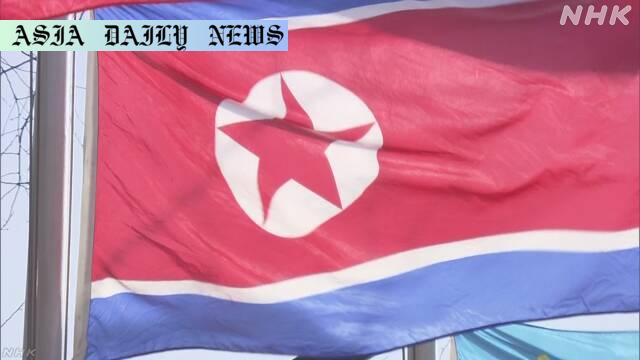North Korea denounces monitoring team’s report as ‘political provocation’, accusing it of obstructing ties with Russia.

Strong Criticism from North Korea
North Korea has issued a powerful response to a recent report by an 11-nation team tasked with monitoring United Nations sanctions. The North Korean foreign ministry, speaking via a statement from the chief of its External Policy Office, condemned the report as a “political provocation.” The country accused the team and its findings of attempting to obstruct its legitimate ties with Russia. This reaction comes after the team published claims detailing military and strategic cooperation between North Korea and Russia, including alleged unlawful transfers of ballistic missiles.
The Formation of the Monitoring Team
The 11-nation monitoring body was established following a deadlock in the UN Security Council panel of experts that previously oversaw sanctions implementation related to North Korea. The panel was forced to cease operations last year when Russia wielded its veto power. Among the nations forming the new multilateral effort are Japan, the United States, and South Korea. Last week’s report marked the first release of findings from this team, and it did not shy away from making bold accusations.
Allegations of Unlawful Arms Transfers
The report claims that North Korea violated UN resolutions by transferring ballistic missiles to Russia in 2022. It also alleges that in return, Russia provided North Korea with advanced defense equipment, including electronic warfare systems and air defense technology. These allegations have added fuel to already intense global scrutiny on Pyongyang and Moscow’s increasing solidarity amid geopolitical tensions.
North Korea’s Sovereignty Argument
In its response, North Korea doubled down on its right to forge military and strategic partnerships. Citing a “comprehensive strategic partnership” framework, the statement highlighted that such cooperation, including mutual military assistance, aligns with the nations’ sovereign rights. The North Korean foreign ministry also criticized interference in its inter-country affairs and threatened to take robust countermeasures to protect its autonomy and interests against what it perceives as encroachments.
Geopolitical Implications
This exchange of accusations underscores the complex and tense dynamics of global geopolitics. Both North Korea and Russia have faced significant international isolation, with sanctions being a key tool in efforts to curb their controversial activities. However, the apparent collaboration between the two nations suggests a strategic defiance against these sanctions. For North Korea, bolstering ties with Russia provides economic and military benefits, while for Russia, a strong alliance with Pyongyang offers leverage amid its strained relations with the West.
The Broader Picture
The formation of the 11-nation monitoring body itself speaks volumes about the shifting balance of power within international institutions like the UN Security Council. Russia’s influence, displayed through its veto power, underscores the limitations of traditional multilateral frameworks in dealing with blatant violations. Conversely, the establishment of new coalitions outside the council shows the determination of other nations to address these challenges, despite opposition from powerful actors.
Looking Ahead
As North Korea continues to defend its sovereignty and strategic alliances, its relationship with the international community remains turbulent. The country’s threats of strong countermeasures hint at a potential escalation in tensions if attempts to curb its actions persist. Furthermore, this incident amplifies the necessity for a unified international approach to handling nations that operate outside the bounds of established norms.
Commentary
North Korea’s Assertion of Sovereignty
The recent statement from North Korea raises significant questions about the interplay of sovereignty and international oversight. Pyongyang’s description of the 11-nation team’s report as a “political provocation” underscores its perception of external interference. In modern geopolitics, the balance between a country’s sovereign rights and the international community’s responsibility to maintain global peace and security remains a delicate issue. On one hand, nations like North Korea argue that their military and strategic partnerships are legitimate exercises of sovereignty. On the other hand, such actions often conflict with established international norms.
Geopolitical Motivations
North Korea’s alignment with Russia reveals a calculated strategy to counterbalance pressure from Western nations. Both nations share similar experiences of sanctions and view mutual cooperation as a path to economic and strategic survival. For North Korea, bolstering ties with a global power like Russia offers both resources and validation. However, these relationships also escalate geopolitical tensions, drawing criticism from the international community.
International Challenges
The situation highlights the challenge of enforcing global norms when key players like Russia and China resist consensus. Not only has Russia vetoed measures to monitor North Korea, but its increasing ties with Pyongyang showcase an effort to defy international sanctions. This dynamic weakens the authority of institutions like the UN Security Council. As this divide widens, smaller nations may find themselves caught between major powers, further complicating the global landscape.
Outlook
Moving forward, the international community must prioritize dialogue even amidst rising tensions. Addressing North Korea’s actions requires a robust yet balanced approach that upholds peace while respecting legitimate sovereign rights. Collaborative frameworks that include all stakeholders may provide a path out of the current impasse. Additionally, nations forming the 11-nation team must continue to present credible evidence and remain transparent to avoid accusations of bias or provocation, ensuring their efforts foster accountability and unity.


